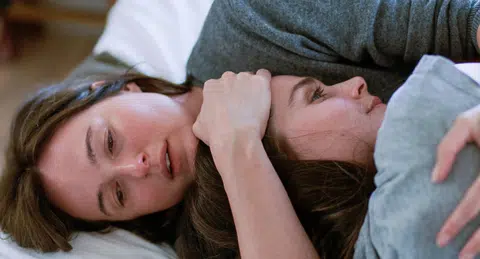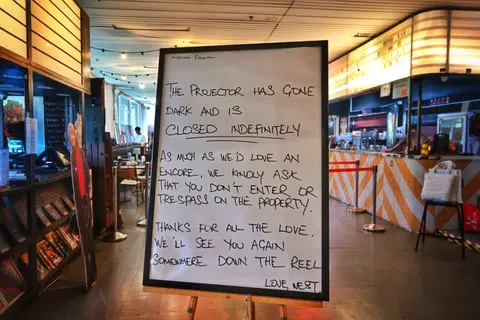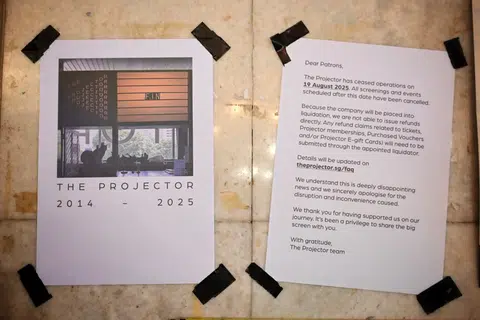Closure of indie cinema The Projector leaves S'pore film distributor Anticipate Pictures in limbo
Mr Vincent Quek, founder of local film distributor Anticipate Pictures, is facing potential closure after almost 10 years in business.
With the sudden shutdown of Singapore indie cinema The Projector on Aug 19, he is stuck - his indie movies that were meant to be screened at that venue are now in limbo.
"If I sit and do nothing, I might have to close by the end of October," he tells The Straits Times.
Mr Quek's team is now scrambling to find alternative screening sites, but they cannot be just any site.
The film purchase agreement requires that these titles be projected in the cinema-grade DCP (Digital Cinema Package) format, with 5.1 or 7.1 surround sound. Also, as some of them are rated M18 or R21, they have to be shown in a venue licensed for such films.
Those now looking for a home include local science-fiction comedy We Can Save The World!!!; made-with-Singapore Japanese drama Renoir; and Amoeba, the coming-of-age feature film debut of Singapore film-maker Tan Siyou.
Also on his list are Danish-Norwegian director Joachim Trier's drama-comedy Sentimental Value and Iranian Jafar Panahi's thriller It Was Just An Accident, winners of the Cannes Film Festival's Grand Prix and Palme d'Or respectively.

Mr Quek, 37, is now in talks with big and small players, including Shaw, Golden Village and Cathay, as well as cultural institutions with DCP projectors such as the National Museum of Singapore, Alliance Francaise, National Gallery Singapore and Oldham Theatre.
Many cinemas require that he rent the facilities from them - a practice called "four-walling". But doing so would worsen his financial situation, he says.
Typically, for-profit cinemas share the box-office takings with the distributor. There is no upfront rental burden on the distributor, and the practice also gives the cinema a stake in the film's box-office success.

"In a four-wall situation, we pay upfront for every seat in the house. Even if we sell every seat at every screening, we will only break even. I would be burning a candle at both ends if I had to pay rent on top of the film's purchase fee," he says.
Halls run by government-linked cultural bodies are not equipped to take on a risk-taking, revenue-sharing role. Also, their spaces tend to be booked well in advance for their own programmes, he adds.
With 15 titles in his catalogue and no venue, Mr Quek hopes that his back catalogue of 80 films, which can be screened at private events with no format restrictions, can provide enough income to tide him over this rough patch.
Neither does he think that the recent supporter-driven petition asking the Government to save The Projector will be successful, because publicly funded institutions have to come under oversight rules that run contrary to a commercial indie cinema's edgy, often controversial spirit.
Some naysayers have commented that The Projector's passing points to a deeper problem. Its closure, along with other art-house cinemas like The Picturehouse (1990 to 2000), indicates that there are too few cinephiles here to keep such operations alive.

He disagrees. "The Projector proved that spaces like this are necessary. People demand them. They are wanted. It worked for over 10 years."
Mr Quek has heard the rumours that there are a handful of parties interested in rescuing The Projector's operations, though at the moment, nothing can be confirmed, perhaps not until the creditors' meeting on Aug 29. The Projector owes its creditors $1.2 million.
It is possible that a film buff with deep pockets could save the day, he says. After all, boutique cinema EagleWings Cinematics in KAP Mall is said to be the passion project of investors who include Dr Julian Theng, founder and medical director of Eagle Eye Centre.
Mr Quek, who teaches the Business of Film course at the Singapore University of Social Sciences, says a revived version of The Projector, if that were to happen, would need a generous landlord willing to see that an indie cinema is not just a commercial enterprise, but also a body with a cultural and social mission.
And it need not be a for-profit enterprise - there are cinemas in Europe that operate as non-profits and charities.

Nevertheless, he is deeply saddened by the closure of an institution that he has worked closely with since 2018, two years after he founded Anticipate Pictures in 2016.
He says: "I've lost a partner. We had a symbiotic process. We needed them because The Projector was the most receptive, and they have the audience. They needed us because we provide the risk-taking to acquire films. We were all in a WhatsApp group, and I'll just tell them, 'Hey, we've got this film. Do you think it's interesting?' And they would let me know.
"We were that close. We have a kind of intimacy that I don't think I would get with a bigger player."
John Lui for The Straits Times